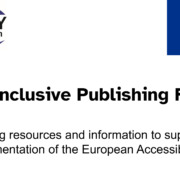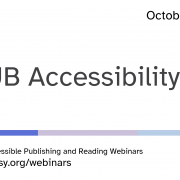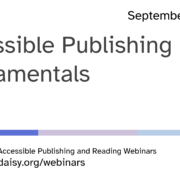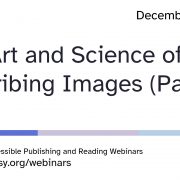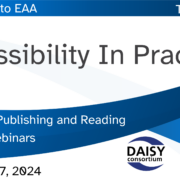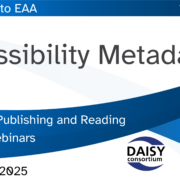Technical Approaches to Upgrading the Backlist for the EAA, T-339 Days (W)
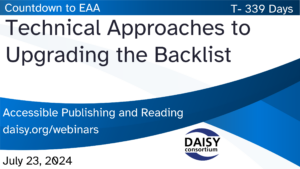
In our new series of EAA monthly webinars July 24th saw a session focused on the complexities of reworking existing materials to incorporate accessibility. This can vary greatly depending on the nature of the published content. There are however a series of strategies that, if adopted, can aid the remediation process. This webinar heard from those actively involved in supporting the rework of backlist titles to ensure they’re compliant with EAA.
This page contains:
Full Video of the Webinar
Speakers
- Richard Orme, The DAISY Consortium—host and chair
- James Yanchak, Taylor and Francis
- Gautier Chomel, EDRLab
- Chiara De Martin, Fondazione LIA
- Thomas Kahlisch, Medibus, Germany
- Katie Durand, French Federation for the Blind
- Daniel Frelen, MTM, Sweden
Session Overview
James Yanchak, Taylor and Francis
With a backlist of over 200,000 titles Taylor and Francis are heavily invested in the backlist issue and their Internal Accessibility Working Group is fully committed to supporting the EAA. James summed up the enormity of the task: Starting out they
had a huge volume, no budget to speak of, gaps in our knowledge, and unknown costs.
To get to grips with this the working group set about making sure that all areas of the company were doing their part to comply with the EAA – in particular joining global conversations, working groups and industry collaborations which brought about the introduction in-house of EPUBCheck and Ace by DAISY to ensure compliance with current standards for ebooks.
This was very revealing and resulted in closer internal checks being put in place to assess accessibility features of EPUB files. This was initially intended for the frontlist but the backlist loomed. Evaluation showed that there were 65,000 titles in EPUB 2 which required remediation. Using a staggered approach with vendors, the task of remediation began. All files were evaluated both by the vendor and via the new in-house EPUB evaulation system.
For simple titles vendors converted directly from EPUB 2 to EPUB 3. For everything else, they converted to EPUB 3 via the XML. Titles that seemed more straightforward were prioritized but there were various challenges along the way. Close communication with vendors was necessary to identify missing items and inconsistencies resulting in at least 30% of titles requiring manual rebuilds.
Working in batches of approximately 3,000 per month, content was fed through to distribution partners who were in danger of being overwhelmed by the flood of remediated backlist titles – some even refused to use them citing the impact on the user experience as a reason! Metadata is also being updated and the hope is that all titles will be replaced with these new, accessible versions.There is still a lot of work to do but this coordinated and thoughtful approach has ensured that Taylor and Francis are on the right road to compliance.
James finished with some top tips for our readers:
- Be prepared to work with your vendors to ensure they understand the accessibility requirements.
- Participate with industry groups to bolster your accessibility knowledge.
- Review and update internal practices to keep them up to date.
- Make sure your accessibility metadata is captured and distributed.
- And finally, always test and review your files because you are the one who must make sure they are accessible.
Gautier Cholmel, EDRLab
Gautier has been very involved in co-ordinating the accessible backlist ebook laboratory project or ABE Lab, which aims to provide publishers with information about options and costs for the remediation of backlist ebooks. This EU funded project has just been completed and it included EDRLab, the LIA Foundation and the National Library of The Netherlands. Amongst the deliverables for this project were:
- a report on backlist data and a gap analysis that provided stakeholders with insights into the number of ebooks actually in the EUmarket and details of their categories, formats and year of production.
- a set of guidelines that provides high level information for producers and developers of remediation tools which Chiara will speak about in this webinar
- the final project report that sums up activities, main findings and outcomes.
What this project has revealed is that there are 3.5 million ebooks on sale in Europe with less than 1% claiming any accessibility metadata! These are hugely diverse, ranging from some countries with an overwhelming number of pdf files to deal with and others with EPUB 3 content. Some are richly integrated with graphics and imagery and others more straightforward to remediate.
Of greater concern is the lack of robust open source tools, apart of course from the validators built by DAISY, namely EPUBCheck, ACE by DAISY and ACE SMART. Gautier gave feedback from three EDRLab members: De Marque, Fenixx and TiteLive, all of whom had specific insight into the remediation of backlist titles in preparation for the EAA. Distribution and service providers are mobilised.
Gautier recommends taking a step by step approach with the following enhancements to workflows and actions
- Add existing open source tools to your workflows now.
- Support organizations working in this field
- Prioritize gradual progress
- Foster understanding and empower ownership
- Image triage – identify images in your files which need correction.
- Send accessibility metadata using the ONIX codelist 196
- Check out the DPUB 2024 presentation: High Impact Action item for your activity workflow.
Chiara De Martin, Fondazione LIA
Working with Gautier and colleagues, Fondazione LIA has been an active participant in the ABE Lab project, a key part of which was researching and testing remediation tools. For the purposes of the project these remediation or conversion tools included a wide variety of technological solutions and IT products from web and cloud platforms to stand alone desktop application to API. These tools all ingest ingest ebook content with the aim of outputting an ebook that should be compliant with accessibility requirements. However, they vary greatly!
For the purposes of the ABE Lab project the focus was on PDF and EPUB files as the ingestion format. The tools can be integrated into remediation workflows, addressing accessibility issues and some of them support batch working methods whilst others work with one file at a time. LIA managed the testing of these tools, assessing their performance and also their shortcomings. A variety of different workflows were tested as detailed by Chiara. The question that was asked during this process was:
Are there remediation tools currently available that are able to fix the accessibility issues and problems that can be found in backlist ebooks?
Sadly there is no easy answer to the question. LIA discovered that there are no magic tools at the moment and the quality of the EPUB 3 export files varied greatly. What has been discovered and worth highlighting is:
- Trying to remediate PDF is very difficult indeed and it’s easier to create a born accessible EPUB 3 file from the source file.
- The remediation of EPUB 3 fixed layout to an accessible reflowable EPUB 3 file is poorly supported. |This is unsurprising as there is no firm consenus on what this might look like.
- Technical issues within the tools themselves seemed to be holding back the success of the solutions – tool development was not good enough.
- The quality of the output isn’t being checked by humans and the AI solutions have some way to go.
The ABE Lab guidance is a high level document for developers, publishers and stakeholders, and it includes two different levels. It lists the technical functionalities necessary for remediation tools and it also includes a checklist for EPUB imitation tools and PDF imitation tools.
Some Industry Perspectives
Our remaining 3 speakers spoke about their enthusiasm for the EAA and what still needs to be done. Thomas Kahlisch is pleased to be collaborating with publishers in Germany in their efforts to create accessible content. Katie Durand is passionate about supporting end users to can benefit from accessible digital ebooks – for many the technology can be overwhelming and it’s important to remember that these readers need support. Daniel Frelen is excited about the levelling of the playing field for readers and hopes that the efforts of EU countries can be streamlined so there are not multiple interpretations in play. This will allow for the further development of open source tools.
Related Resources
- Full transcript Word document
- EAA resources page
- European Accessibility Act
- DAISY Tools suite
- ABELab project website
- ABELab Report on Backlist Data and gap analysis
- ABELab Guidelines for remediation tools producers
- ABELab Final Public Report
- ABELab remediation tools tested
- DPUB Summit 2024 presentation on High impact action items for your accessibility workflow
Guest presenter links:


